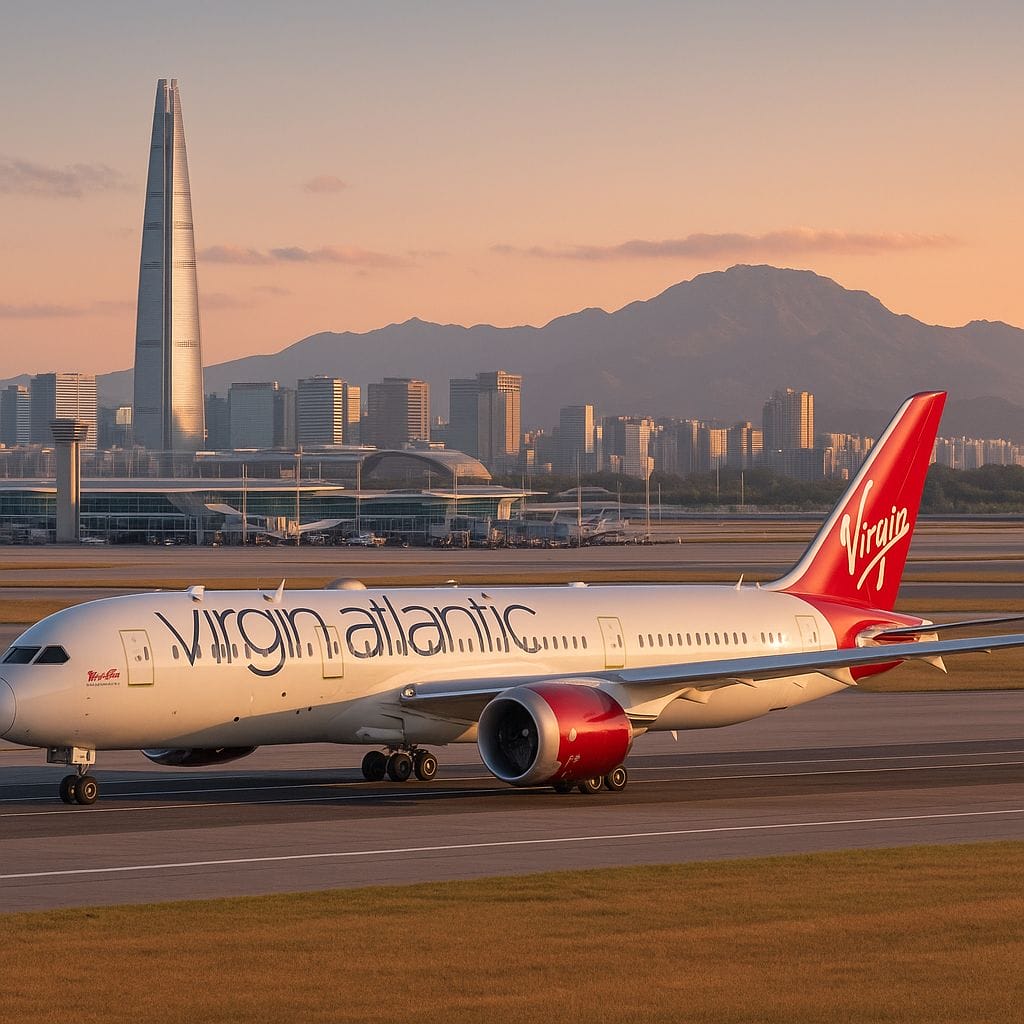Virgin Atlantic’s long-anticipated launch of direct flights between London Heathrow and Seoul Incheon has encountered a significant delay, stalling a critical route tied to legal obligations and competitive expansion in the Asia-Pacific market. With regulatory approvals in South Korea still pending, Virgin has suspended ticket sales, casting uncertainty over its ability to secure valuable London Heathrow slots.
A Legally Mandated Route Hits Turbulence
The route, originally scheduled to begin operations in March 2026, was not just a strategic expansion—it was a regulatory mandate. As part of conditions imposed by the UK Competition and Markets Authority (CMA) during the 2023 approval of the Korean Air-Asiana merger, Virgin Atlantic committed to operating the London-Seoul service to maintain competitive balance on the route.
Now, that commitment is at risk. South Korean aviation regulators have yet to grant final permission, prompting Virgin to pause all bookings as of June 2025. The delay raises serious concerns about Virgin’s ability to meet its legal obligations, as well as broader implications for competitive aviation routes between Europe and Asia.
Heathrow Slots: A Strategic Goldmine
At the heart of Virgin Atlantic’s urgency lies a coveted prize: an additional permanent pair of landing and takeoff slots at London Heathrow. These slots are notoriously scarce and highly valuable. Operating the Seoul route continuously for three years would guarantee Virgin permanent access to these slots, offering long-term leverage in global route planning.
The delay in regulatory approvals now threatens this timeline. Without a successful launch, Virgin risks losing this rare opportunity to strengthen its operational footprint at Heathrow, the UK’s busiest airport and a strategic hub for international travel.
Route Beyond Profit: A Strategic Imperative
Virgin’s push into Seoul is more than a commercial endeavor—it’s a regulatory obligation with high strategic stakes. Unlike previous routes such as Accra or São Paulo, which were discontinued due to market viability, the Seoul route was effectively carved into law.
For Virgin, the opportunity also opens the door to a lucrative Asian market, including corporate travel contracts, transcontinental cargo, and premium leisure traffic. Even if the route operates at a loss in the short term, the potential long-term strategic gain via Heathrow slots and Asian market entry remains immense.
Aircraft and In-Flight Product Considerations
The route is expected to be serviced by Virgin Atlantic’s Boeing 787-9 Dreamliner fleet, offering fuel efficiency and range suitable for the long-haul mission. However, some industry analysts note that Virgin’s Upper Class cabin, which debuted in 2003, may fall short of the standards now offered by Korean carriers and other premium Asian airlines.
Still, Virgin is likely to bank on competitive pricing, strong SkyTeam alliance support, and seamless connectivity through Heathrow to attract both business and leisure travelers.
Tentative Schedule and Market Readiness
Despite the delay in ticket sales, Virgin Atlantic’s schedule remains active in global booking systems. Flight VS208 is currently slated to depart London at 09:45 on March 29, 2026, arriving in Seoul the next morning. The return leg, VS209, is expected to depart Seoul at 08:35 and land in London by 15:05 the same day.
Yet with no certainty over final regulatory approval, the schedule remains tentative, leaving passengers and travel partners in a state of limbo.
Wider Industry Implications and Competitive Pressure
Virgin’s delayed launch has triggered ripples across the aviation industry. Competitors such as Korean Air, Asiana, and European carriers are closely watching how Virgin navigates this challenge. Any failure to launch could impact the CMA’s trust in regulatory commitments from the Korean Air-Asiana merger.
Moreover, it could weaken Virgin’s strategic positioning in Asia, an area where the airline has historically under-penetrated. With global aviation rebounding in 2025, securing and maintaining viable Asian routes is more critical than ever for international carriers.
What Lies Ahead for Virgin Atlantic
The path forward for Virgin Atlantic depends on swift resolution with South Korean aviation authorities. Time is of the essence. Further delays could jeopardize both regulatory compliance and strategic ambitions, not to mention public and stakeholder confidence.
Yet the airline appears determined to proceed. Industry observers suggest Virgin may be willing to operate the route at minimal margins or losses for the sake of long-term positioning.
Conclusion: A Defining Test in Virgin Atlantic’s Global Strategy
Virgin Atlantic’s Seoul saga is more than just a route delay—it is a defining test of regulatory diplomacy, market agility, and strategic patience. As legal deadlines approach and the pressure to deliver mounts, Virgin must overcome bureaucratic roadblocks to secure its future in Asia and at Heathrow.
The outcome will not only shape Virgin’s international trajectory but will also influence how airlines navigate increasingly complex intersections of law, competition, and global market access in the aviation sector.
For more travel news like this, keep reading Global Travel Wire
















